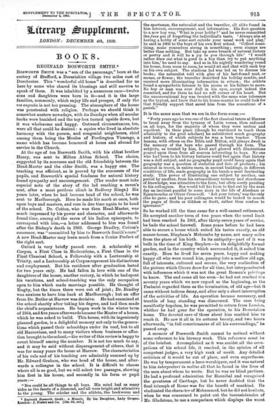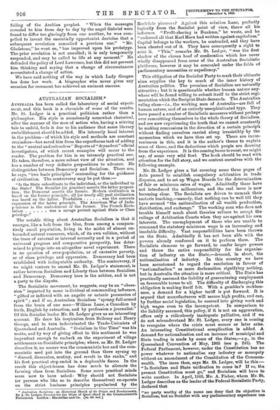BOOKS.
REGINALD BOSWORTH SMITH.* BoswonTu Sanwa was a "son of the parsonage," born at the rectory of Stafford, a Dorsetshire village two miles east of Dorchester. This "wonderful old home" is described for us here by some who shared its blessings and still survive to speak of them. It was inhabited by a numerous race—twelve sons and daughters were born in it—and it is the large families, commonly, which enjoy life and prosper, if only the res mujusta is not too pressing. The atmosphere of the house was penetrated with religion. Perhaps we should think it somewhat austere nowadays, with its Sundays when all secular books were banished and the toy-box turned upside down, but it was wholesome and happy. Outward circumstances, too, were all that could be desired : a squire who lived in absolute harmony with the parson, and congenial neighbours, chief among them being the Mottles of Fordington Vicarage, a name which has become honoured. at home and abroad for service in the Church.
At the age of ten Bosworth Smith, with his eldest brother Henry, was sent to Milton Abbas School The choice, suggested by its nearness and the old friendship between the Head-Master and the elder Smith, was a happy one. The teaching was efficient, as is proved by the successes of the pupils, and Bosworth's special fondness for natural history found sympathy and encouragement. (The reader must take especial note of the story of the lad reaching a raven's nest, after a most perilous climb in Badbnry Rings.) Six years later, when he had become head of the school, he was sent to Marlborough. Here he made his mark at once, both upon boys and masters, and rose in due time again to be head of the schooL Dr. Cotton, who was then Head-Master, was much impressed by his power and character, and afterwards found time, among all the cares of his Indian episcopate, to correspond with him,—a letter addressed to him was found after the Bishop's death in 1866. George Bradley, Cotton's successor, was "committed by him to Bosworth Smith's care." A new Head-Master may learn much from a Senior Prefect of the right sort.
Oxford is very briefly passed. over. A scholarship at Corpus, a First Class in Moderations, a First Class in the Final Classical School, a, Fellowship with a Lectureship at Trinity, and a Lectureship at Corpus represent his distinctions and employment. But his residence after graduation lasted for two years only. He had fallen in love with one of the daughters of the house, another rectory, in which he had spent his vacations, and school-teaching was the only occupation open to him which made marriage possible. He thought of Rugby, but the times there were out of joint ; Dr. Bradley was anxious to have him back at Marlborough ; but an offer from Dr. Butler at Harrow was decisive. He had examined at the school shortly after taking his degree, and had then made the chief's acquaintance. He began work in the winter term of 1864, and five years afterwards became the Master of a house, which he was asked to build. This house, with its ingeniously planned garden, is a delightful memory not only to the genera- tions which passed their schooldays under its roof, but to all old Harrovians, and to many visitors whom business or affec- tion brought to the school,—the writer of this review is happy to count himself among the number. It is not too much to say, and it may be said without disparagement of others, that it was for many years the house at Harrow. The characteristics of his rule and of his teaching are admirably summed up by Mr. Edward Graham, who was head of the house, and after- wards a colleague in the school. It is difficult to choose where all is so good, but we will select two passages, showing him first in his house, and secondly in his form or pupil room "Boa could be all things to all boys. Ills mind had as many sides as the facets of a diamond, and all were bright and attractive to the young. The scholar and the athlete, the bookworm and
• Reginald Bosworth Smith : a Memoir. By his Daughter, Dad,y Grogan. London: J. Nisbet and Co. lies. 6d. net.] the sportsman, the naturalist and the traveller, all alike found in him interest, encouragement, and information. His first question to a new boy was, W hat is your hobby P' and he never committed the faux pas of forgetting the individual's taste. Always aim at having a hobby of some sort outside your usual work and play,' he said in 1903 to the boys of his own first school. Collect some- thing, make yourselves strong in something ; even stamps are better than nothing. But take np some branch of natural history or poetry and it will be a joy to you through life.' I would rather draw out what is good in a boy than try to put anything into him,' he used to say. And so in his nightly wandering round his house, from room to room, he would sit and chat with each boy on his own subject. The studious lad was led on to discuss his books ; the naturalist told with glee of his last-found nest, or mouse, or flower ; the traveller described his holiday ramble, and received more illuminating information in return ; the athlete found a sympathetic listener to his scores or his failure to score. No boy or man was ever dull in his eyes, except indeed the conceited, and for them he had no soft corner of his heart. But the unconventional boy was treated with the same wise tolerance as the typical, and knew that to his house-master he could look for that friendly support that saved him from the sensations of a pariah."
It is the same man that we see in the form-room :— " Forty years ago he was one of the first classical tutors at Harrow to break away from the tyranny of Latin verses, then enforced on all boys, for the majority of whom they were useless and repellent. In their place (though he continued to teach them admirably to the good scholars) he substituted much geography and history, of which subjects he was a born teacher. These lessons, with others on the Bible and Milton, will always dwell in the memory of the boys who passed through his form. The subjects, as treated by him, lived and glowed with illustrations poured upon them from all sources interesting to boys. No one who had been to his history lectures could feel again that history was a dull subject, and no geography pupil could fancy again that geography was a question of statistics and lists of products ; his interest in travel, in native races, in ancient buildings, in different conditions of life, made geography in his hands a most fascinating study. This power of illustrating one subject by another, one period by another, from his extraordinary memory and storehouse of knowledge, was attractive to the form, but often sorely puzzling to his colleagues. Boa would tell his form to find out by the next day an incident parallel to some story in the life of Abraham or Epaminondas or Oliver Cromwell. Ask your tutors,' was the only clue he gave : and his poor colleagues would bo tasked to search the pages of Grote or Gibbon or Scott, rather than confess to ignorance."
So he worked till the time came for a well-earned retirement. He accepted another term of two years when the usual limit had been reached In 1901, after thirty-seven years of service, he bade the school farewell. Some years before be had been able to secure a house which suited his tastes exactly, an old manor-house, Bingham's Melcombe by name, not many miles from the place of his birth. In its antiquity—part of it was built in the time of King Stephen—in its delightfully formal garden, and in the country which surrounded it, it suited him exactly. Here he lived for seven years, happy and making happy all who were round him, passing into a mellow old age, full of interests, cultured and serene, the very realisation of the picture which Cicero drew for all time, but interpenetrated with influences which it was not the great Roman's privilege to know. The end came all too soon—he had not reached the seventy years which we now regard as the beginning, as the Psalmist regarded them as the termination, of old age—bat it came without tedious decay, and after only a short interruption of the activities of life. An operation became necessary, and trouble of long standing was discovered. The case being manifestly hopeless, he was permitted to return from London, whither he had gone for the operation, to his Dorsetahire home. The devoted care of those about him enabled him to reach it. He saw it all in its autumn beauty, and two hours afterwards, "in full consciousness of all his surroundings," he
passed away.
A memoir of Bosworth Smith cannot be noticed without some reference to his literary work. This reference must be of the briefest. Accomplished as it was amidst all the occu- pations of his school life, it reached, in the opinion of all competent judges, a very high rank of merit. Any detailed criticism of it would be out of place, and even superfluous. He was by temperament a hero-worshipper, and it was natural to him interpretari in melius all that he found in the lives of the men about whom he wrote. But be was no blind partisan. He had a profound admiration for Hannibal and recognised the greatness of Carthage, but he never doubted that the final triumph of Rome was for the benefit of mankind. He vindicated the character of -Mohammed, but he did not hesitate, when he was concerned to point out the inconsistencies of Mr. Gladstone, to use a comparison which displays the worst
failing of the Arabian prophet. " When the messages revealed to him from day to day by the angel Gabriel were found to differ too glaringly from one another, he was com- pelled to invent the essentially opportunist doctrine that a subsequent revelation cancelled a previous one." " Mr. Gladstone," he went on, " has improved upon his prototype. The prior revelation is not annulled; it is only temporarily suspended, and may be called to life at any moment." He defended the policy of Lord Lawrence, but this did not prevent him thinking and saying that a change of circumstances necessitated a change of action.
We have said nothing of the way in which Lady Grogan has done her work. A biographer who never gives any occasion for comment has achieved an eminent success.







































































 Previous page
Previous page